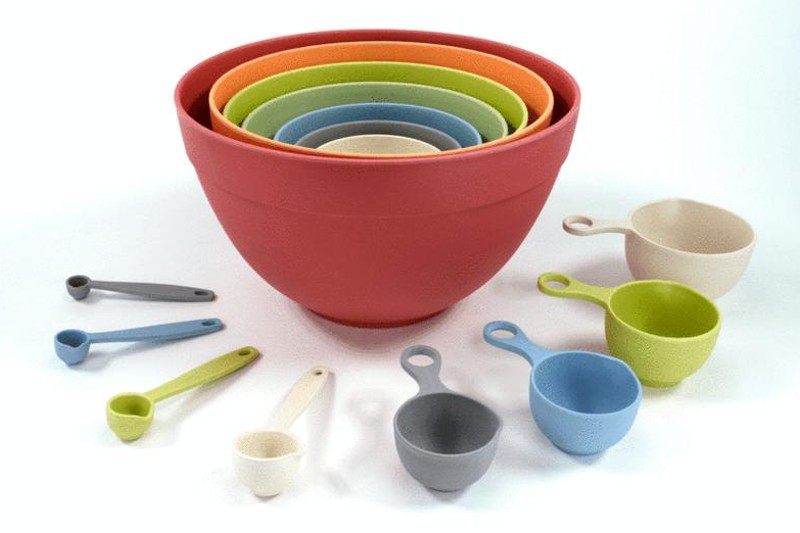
Compared to metal and wood, nothing really beats plastic’s slippery yet giving, supple yet firm surface for mixing and measuring. The downside is that after disposal, it will take at least a thousand years for the kitchenware to decompose. Enter Bamboozle’s bio-plastics.
This weekend the company that produces plastic-like kitchenware from a combination of bamboo and other renewable sources, put together a ‘Baking Bundle’ for sale at 20% off. At-home and/or in-restaurant chefs can scale up their cooking tools while cutting back on disposable plastic use with Bamboozle’s seven nesting bowls and seven-piece measuring cups and spoon set.
Bamboozle built loyalty during the pandemic by providing an alternative to single-use plastic, and it’s now looking to expand into more homes. While supplying sustainable cookware, the firm looks to have nailed the design as well. The ‘Baking Bundle’ has three color scheme options — a red, orange, blue, green, and gray line reminiscent of earthy, 1970s décor, a purple, blue, and gray combo that brings the bright funk, and a minimalist/industrial gray set.
To create its cooking and dining ware, the six-year-old company uses Astrik, a 15% bamboo and 85% polylactic acid mix to create dishes, bowls, composter, and other kitchenware. (The plastic-like PLA, mixed in the Midwest, is manufactured with a combination of renewable sources such as corn starch, sugarcane, and/or tapioca.)
Related Guides
Bamboozle constructs many of its products from machines converted from use in the plastics industry. The company claims that only one-fifth of the greenhouse gases are emitted in making its products as compared to its plastic competition. Of course, once Bamboozle wares reach the end of their lifespans, they are biodegradable and don’t end up in toxic oceans and/or as landfill waste that persists for hundreds of years.
The firm also intends to connect with smaller retailers who vend additional environmentally friendly products. As independent stores re-emerge in a new world, Bamboozle aims to be at the edge of the shift to zero-waste products. Sustainable goods tend to be more expensive than one-off plastics, which is why Bamboozle likes to surprise its base with sales.
Bamboozle’s 14-piece, non-toxic, plant-based Baking Bundle is on sale through this weekend for $86; www.bamboozlehome.com.
Read More: Best Buy Mini Food Processor Deal



